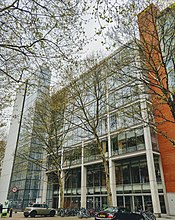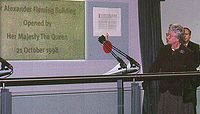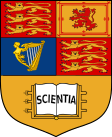Imperial College Faculty of Medicine: Difference between revisions
AFC draft (via script) |
Add further sources |
||
| Line 8: | Line 8: | ||
| image_alt = |
| image_alt = |
||
| caption = Sir Alexander Fleming Building |
| caption = Sir Alexander Fleming Building |
||
| established = {{Start date|2003}}<ref name= |
| established = {{Start date|2003}}<ref name=hg /> |
||
| closed = <!-- {{End date|YYYY}} --> |
| closed = <!-- {{End date|YYYY}} --> |
||
| type = |
| type = |
||
| Line 37: | Line 37: | ||
== History == |
== History == |
||
Medical teaching at Imperial dates back to the founding of [[Charing Cross Hospital Medical School]] in 1823, which was followed by other medical schools including [[Chelsea and Westminster Hospital Medical School]], [[St Mary's Hospital Medical School]], and the [[Royal Postgraduate Medical School]]. These preceding medical schools were home to numerous medical researchers, including [[Sir Alexander Fleming]], who discovered [[penicillin]] at whilst working at St Mary's.<ref>{{cite-web|url=https://www.acs.org/content/acs/en/education/whatischemistry/landmarks/flemingpenicillin.html|title=Discovery and Development of Penicillin|publisher=American Chemical Society|access-date=11 December 2019}}</ref> St Mary's became part of Imperial in 1988, with the rest merging to form Imperial College School of Medicine in 1995.<ref name="timeline">{{Cite web|url=https://www.imperial.ac.uk/about/history/college-developments/|title=A timeline of College developments|last=|first=|date=|website=www.imperial.ac.uk|publisher=Imperial College London|access-date=2018-12-27}}</ref> |
Medical teaching at Imperial dates back to the founding of [[Charing Cross Hospital Medical School]] in 1823, which was followed by other medical schools including [[Chelsea and Westminster Hospital Medical School]], [[St Mary's Hospital Medical School]], and the [[Royal Postgraduate Medical School]]. These preceding medical schools were home to numerous medical researchers, including [[Sir Alexander Fleming]], who discovered [[penicillin]] at whilst working at St Mary's.<ref>{{cite-web|url=https://www.acs.org/content/acs/en/education/whatischemistry/landmarks/flemingpenicillin.html|title=Discovery and Development of Penicillin|publisher=American Chemical Society|access-date=11 December 2019}}</ref> St Mary's became part of Imperial in 1988, with the rest merging to form Imperial College School of Medicine in 1995.<ref name="timeline">{{Cite web|url=https://www.imperial.ac.uk/about/history/college-developments/|title=A timeline of College developments|last=|first=|date=|website=www.imperial.ac.uk|publisher=Imperial College London|access-date=2018-12-27}}</ref> To accomodate medical activities at South Kensington, the Sir Alexander Fleming building was opened in October 1998, designed by [[Foster + Partners]] and costing £65m.<ref name=hg>{{cite book|url=https://books.google.com/books?id=2BpqDQAAQBAJ|title=The History of Imperial College London, 1907-2007|pages=18,21–22,69, 99,102,188,207,306,418|first=Hannah|last=Gay|date=2007|publisher=Imperial College Press|isbn=9781860947087}}</ref> |
||
| ⚫ | |||
The Faculty of Medicine was created as part of a college-wide restructuring announced in 2001, taking over research responsibilities from the School of Medicine, which in turn was restricted to only teaching the undergraduate course.<ref>[http://live.cgcu.net/news/?id=1138 Live! – News: Science Faculties to Re-Merge] {{webarchive|url=https://web.archive.org/web/20051231052851/http://live.cgcu.net/news/?id=1138 |date=31 December 2005 }}</ref> |
The Faculty of Medicine was created as part of a college-wide restructuring announced in 2001, taking over research responsibilities from the School of Medicine, which in turn was restricted to only teaching the undergraduate course.<ref>[http://live.cgcu.net/news/?id=1138 Live! – News: Science Faculties to Re-Merge] {{webarchive|url=https://web.archive.org/web/20051231052851/http://live.cgcu.net/news/?id=1138 |date=31 December 2005 }}</ref> The faculty has since had input on biomaterials and bioengineering courses across the college, and been reorganised into 8 academic departments.<ref name=hg /><ref>{{cite-web|url=https://wwwf.imperial.ac.uk/blog/announcements/2018/12/21/new-department-structure-in-the-faculty-of-medicine-and-new-heads-of-department/|title=New department structure in the Faculty of Medicine and New Heads of Department|date=21 December 2018|access-date=14 December 2019}}</ref> |
||
| ⚫ | |||
== Campuses == |
== Campuses == |
||
| Line 55: | Line 55: | ||
The faculty also has a presence at its many other associated hospitals across London.<ref>{{cite-web|url=https://www.imperial.ac.uk/medicine/study/nwtfs/our-nhs-trusts/|title=Our NHS Trusts|access-date=11 December 2019|publisher=Imperial College London}}</ref> |
The faculty also has a presence at its many other associated hospitals across London.<ref>{{cite-web|url=https://www.imperial.ac.uk/medicine/study/nwtfs/our-nhs-trusts/|title=Our NHS Trusts|access-date=11 December 2019|publisher=Imperial College London}}</ref> |
||
== Academics == |
== Academics == |
||
The faculty is closely linked to the [[National Health Service]], and organises research and teaching through [[Imperial College Healthcare NHS Trust]] and |
The faculty is closely linked to the [[National Health Service]], and organises research and clinical teaching through its [[Imperial College Healthcare NHS Trust]] hospitals, which is among the largest in the country, and other affiliated hospitals around London.<ref>{{cite-web|url=https://www.imperial.ac.uk/medicine/study/undergraduate/electives-and-clinical-attachments/|title=Electives and Clinical Attachments, Faculty of Medicine|access-date=14 December 2019|publisher=Imperial College London}}</ref><ref>{{cite-web|url=https://publicappointments.cabinetoffice.gov.uk/appointment/imperial-college-healthcare-nhs-trust-chair/|title=Imperial College Healthcare NHS Trust - Chair, HM Government Public Appointments|publisher=Cabinet Office|access-date=14 December 2019}}</ref> It has also conducted studies on strategies for improving medical teaching and student preparation.<ref>{{cite-web|url=https://www.dovepress.com/maximizing-the-acquisition-of-core-communication-skills-at-the-start-o-peer-reviewed-article-AMEP|title=Maximizing the acquisition of core communication skills at the start of medical training|publisher=Dove Press|doi=10.2147/AMEP.S212727|access-date=11 December 2019|date=18 April 2019}}</ref><ref>{{cite-web|url=https://www.dovepress.com/preparing-for-the-national-health-service-the-importance-of-teamwork-t-peer-reviewed-article-AMEP|title=Preparing for the National Health Service: the importance of teamwork training in the United Kingdom medical school curriculum|publisher=Dove Press|doi=10.2147/AMEP.S203333|access-date=11 December 2019|date=29 January 2019}}</ref> The faculty is home to many research institutes, including the [[Partnership for Child Development]] and the London Institute of Medical Sciences, which is also a [[Medical Research Council (United Kingdom)|Medical Research Council]] institute.<ref>{{cite-web|url=https://www.londonntd.org/partnership-for-child-development|title=Partnership for Child Development|publisher=London Centre for Neglected Tropical Disease Research|access-date=14 December 2019}}</ref><ref>{{cite-web|url=https://lms.mrc.ac.uk/about-us/lms-imperial/|title=LMS & Imperial College London|publisher=London Institute of Medical Sciences}}</ref> It is also one of the founding institutions of the [[Francis Crick Institute]], an inter-university medical research centre in London, and the largest biomedical laboratory in Europe.<ref>{{cite-web|url=https://www.crick.ac.uk/about-us/our-history/our-founders|publisher=Crick|access-date=11 December 2019|title=Our Founders}}</ref><ref>{{cite news|url=https://www.theguardian.com/science/2010/jun/19/largest-biomedical-research-facility-europe|title=Plans for largest biomedical research facility in Europe unveiled|accessdate=11 August 2010|publisher=The Guardian| location=London | first=Alok | last=Jha | date=19 June 2010}}</ref> |
||
=== School of Public Health === |
|||
The School of Public Health is the faculty's research centre for epidemiology and public health, and includes the Medical Research Council's Centre for Global Infectious Disease Analysis.<ref>{{cite-web|url=https://gtr.ukri.org/projects?ref=MR%2FR015600%2F1|title=MRC Centre for Global Infectious Disease Analysis|publisher=UK Research and Innovation|access-date=14 December 2019}}</ref> The school also offers postgraduate and intercalated undergraduate courses.<ref>{{cite-web|url=https://www.imperial.ac.uk/school-public-health/study/|title=Study, School of Public Health|publisher=Imperial College London}}</ref> In 2019 the school established the Abdul Latif Jameel Institute for Disease and Emergency Analytics following a £25m donation from the Jameel family. The school is to move to premises at the college's new White City campus once construction is complete.<ref>{{cite-news|url=https://www.ft.com/content/414bd008-ef3d-11e9-bfa4-b25f11f42901|publisher=Finacial Times|date=15 October 2019|access-date=14 December 2019|title=Imperial to set up disease research centre with Saudi support}}</ref> |
|||
=== Medical |
=== Medical school === |
||
{{further|Imperial College School of Medicine}} |
{{further|Imperial College School of Medicine}} |
||
Revision as of 10:09, 14 December 2019
This article, Imperial College Faculty of Medicine, has recently been created via the Articles for creation process. Please check to see if the reviewer has accidentally left this template after accepting the draft and take appropriate action as necessary.
Reviewer tools: Inform author |
 Sir Alexander Fleming Building | |
Former names | Imperial College School of Medicine |
|---|---|
| Established | 2003[1] |
| Dean | Professor Jonathan Weber[2] |
Academic staff | 450[3] |
Administrative staff | 1,114 |
| Undergraduates | 2,188 |
| Postgraduates | 1,927 |
| Location | , |
| Campus | South Kensington, Hammersmith, Chelsea and Westminster, St Mary's, Charing Cross, Royal Brompton[4] |
| Colours | |
| Website | www |
The Faculty of Medicine is the academic centre for medical and clinical research and teaching at Imperial College London. It contains the Imperial College School of Medicine, which is the college's undergraduate medical school.
History
Medical teaching at Imperial dates back to the founding of Charing Cross Hospital Medical School in 1823, which was followed by other medical schools including Chelsea and Westminster Hospital Medical School, St Mary's Hospital Medical School, and the Royal Postgraduate Medical School. These preceding medical schools were home to numerous medical researchers, including Sir Alexander Fleming, who discovered penicillin at whilst working at St Mary's.[5] St Mary's became part of Imperial in 1988, with the rest merging to form Imperial College School of Medicine in 1995.[6] To accomodate medical activities at South Kensington, the Sir Alexander Fleming building was opened in October 1998, designed by Foster + Partners and costing £65m.[1]

The Faculty of Medicine was created as part of a college-wide restructuring announced in 2001, taking over research responsibilities from the School of Medicine, which in turn was restricted to only teaching the undergraduate course.[7] The faculty has since had input on biomaterials and bioengineering courses across the college, and been reorganised into 8 academic departments.[1][8]
Campuses
The medical school is based at the Sir Alexander Fleming Building on Imperial College Road in South Kensington. It also has many hospital campuses across London with teaching, research and library facilities:[4]
The faculty also has a presence at its many other associated hospitals across London.[9]
Academics
The faculty is closely linked to the National Health Service, and organises research and clinical teaching through its Imperial College Healthcare NHS Trust hospitals, which is among the largest in the country, and other affiliated hospitals around London.[10][11] It has also conducted studies on strategies for improving medical teaching and student preparation.[12][13] The faculty is home to many research institutes, including the Partnership for Child Development and the London Institute of Medical Sciences, which is also a Medical Research Council institute.[14][15] It is also one of the founding institutions of the Francis Crick Institute, an inter-university medical research centre in London, and the largest biomedical laboratory in Europe.[16][17]
School of Public Health
The School of Public Health is the faculty's research centre for epidemiology and public health, and includes the Medical Research Council's Centre for Global Infectious Disease Analysis.[18] The school also offers postgraduate and intercalated undergraduate courses.[19] In 2019 the school established the Abdul Latif Jameel Institute for Disease and Emergency Analytics following a £25m donation from the Jameel family. The school is to move to premises at the college's new White City campus once construction is complete.[20]
Medical school
The faculty offers a 6-year MBBS course through its School of Medicine, which includes an intercalated year leading to a BSc. The school also offers intercalated programmes for external students, and has partnered with Nanyang Technological University in Singapore to run its Lee Kong Chian School of Medicine, for which is has developed the medical curriculum.[21][22]
See also
References
- ^ a b c Gay, Hannah (2007). The History of Imperial College London, 1907-2007. Imperial College Press. pp. 18, 21–22, 69, 99, 102, 188, 207, 306, 418. ISBN 9781860947087.
- ^ "Faculty Leadership". Imperial College London. Retrieved 11 December 2019.
- ^ "Statistics Pocket Guide 2018–19" (PDF). Imperial College London. Retrieved 11 December 2019.
- ^ a b "Campus Information". Imperial College London. Retrieved 11 December 2019.
- ^ "Discovery and Development of Penicillin". American Chemical Society. Retrieved 11 December 2019.
- ^ "A timeline of College developments". www.imperial.ac.uk. Imperial College London. Retrieved 2018-12-27.
- ^ Live! – News: Science Faculties to Re-Merge Archived 31 December 2005 at the Wayback Machine
- ^ "New department structure in the Faculty of Medicine and New Heads of Department". 21 December 2018. Retrieved 14 December 2019.
- ^ "Our NHS Trusts". Imperial College London. Retrieved 11 December 2019.
- ^ "Electives and Clinical Attachments, Faculty of Medicine". Imperial College London. Retrieved 14 December 2019.
- ^ "Imperial College Healthcare NHS Trust - Chair, HM Government Public Appointments". Cabinet Office. Retrieved 14 December 2019.
- ^ "Maximizing the acquisition of core communication skills at the start of medical training". Dove Press. 18 April 2019. doi:10.2147/AMEP.S212727. Retrieved 11 December 2019.
{{cite web}}: CS1 maint: unflagged free DOI (link) - ^ "Preparing for the National Health Service: the importance of teamwork training in the United Kingdom medical school curriculum". Dove Press. 29 January 2019. doi:10.2147/AMEP.S203333. Retrieved 11 December 2019.
{{cite web}}: CS1 maint: unflagged free DOI (link) - ^ "Partnership for Child Development". London Centre for Neglected Tropical Disease Research. Retrieved 14 December 2019.
- ^ "LMS & Imperial College London". London Institute of Medical Sciences.
- ^ "Our Founders". Crick. Retrieved 11 December 2019.
- ^ Jha, Alok (19 June 2010). "Plans for largest biomedical research facility in Europe unveiled". London: The Guardian. Retrieved 11 August 2010.
- ^ "MRC Centre for Global Infectious Disease Analysis". UK Research and Innovation. Retrieved 14 December 2019.
- ^ "Study, School of Public Health". Imperial College London.
- ^ "Imperial to set up disease research centre with Saudi support". Finacial Times. 15 October 2019. Retrieved 14 December 2019.
- ^ "NTU Singapore scientists convert plastics into useful chemicals using sunlight". eurekalert.org. American Association for the Advancement of Science. 11 December 2019. Retrieved 11 December 2019.
- ^ "Curriculum Development". Imperial College London. Retrieved 11 December 2019.


